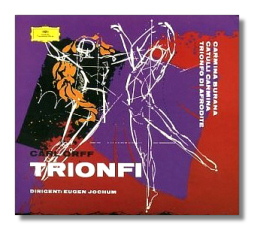
The Internet's Premier Classical Music Source
Related Links
- Orff Reviews
- Latest Reviews
- More Reviews
-
By Composer
-
Collections
DVD & Blu-ray
Books
Concert Reviews
Articles/Interviews
Software
Audio
Search Amazon
Recommended Links
Site News
 CD Review
CD Review
Carl Orff

Trionfi
(Trittico teatrale)
- Carmina Burana
- Catulli Carmina
- Trionfo di Afrodite
Annelies Kupper, Elisabeth Lindermeier,
Elfriede Trötschel, Elisabeth Wiese-Lange, sopranos
Ratko Delorko, Richard Holm, Paul Kuen, tenors
Hans Braun, baritone
Kurt Böhme, bass
Bavarian Radio Symphony & Chorus/Eugen Jochum
Deutsche Grammophon 474131-2 ADD mono 2CDs: 55:39, 76:38
The reissue of these half-century old recordings can be explained first by the continued popularity of Orff's Carmina Burana (first in his triptych of Trionfi or "triumphs") and second by the persistence of graying record collectors who still appreciate the work of conductor Eugen Jochum (1902-1987). I'm not sure if these recordings were the works' first, but if not, they were darn close. (This Carmina Burana was recorded in 1952, and the other two works were recorded in 1954-55.)
Jochum went on to re-record Carmina Burana and Catulli Carmina (not Trionfo di Afrodite, I believe) in the stereo era, and those recordings are classics – and readily available on CD. In the former, Jochum's team of Gundula Janowitz, Dietrich Fischer-Dieskau, and Gerhard Stolze is unbeatable; hear Janowitz sing "In trutina" and you'll never want to hear anyone else sing it again. (Here, Elfriede Trötschel doesn't even come close.)
Given the superiority of Jochum's later Carmina Burana, there's little reason to prefer this 1952 version. The sound is harsh, the choral singing is unrefined, and the baritone is poor – "Estuans interius" is almost embarrassing. On the plus side, Jochum's conducting is skillful and there moments (the flute solo in "Chume, chum, geselle min!") where the freshness would not be recaptured later. Moments are hardly enough; however, to make this is a viable recording for the general collector.
Catulli Carmina and Trionfo di Afrodite are better. In the former, Richard Holm is an ardent Catullus, and his voice is appealingly young and fresh. The smaller choir sings with a precision and tonal refinement quite absent in Jochum's earlier Carmina Burana. Trionfo di Afrodite sometimes sounds a little mechanical (even Orff commented about his own "rubber-stamp music") but Jochum infuses it with unusual tenderness and flexibility. Bass Kurt Böhme doesn't ham up his solos as much as later singers have done, and I was grateful for that.
No texts are included, but there are short summaries of the two more unfamiliar works. I wish Richard Osborne's annotations had discussed Jochum's association with Orff more fully. The digipak presentation is attractive; some of Deutsche Grammophon's original recording documentation is reproduced.
This set has undeniable historical value, then, but its musical values are more debatable.
Copyright © 2007, Raymond Tuttle




















